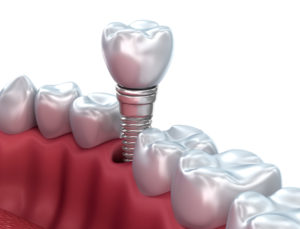Will dental implants affect natural, adjacent teeth?


Why Dental Implants Stand Alone
Dental implants are made of titanium, which is a biocompatible material. Therefore, the bone tissue in the jaw is capable of forming a strong bond with the dental implant. This osseointegration proceeds over the course of several months after the oral surgeon places the dental implant. When osseointegration is complete, the dental implant becomes a fixture in the jaw. The dental implant alone is capable of supporting an individual crown, or multiple dental implants can be used to anchor a bridge to replace multiple missing teeth.
A conventional dental bridge requires crowns to be placed on adjoining teeth in order to support the pontic. That process requires healthy tooth material to be removed to make room for the crown, and crown placement can weaken an otherwise healthy tooth. This is among the multiple reasons why dental implants are considered to be a superior tooth replacement alternative to conventional bridges and dentures.
What To Expect From Dental Implant Placement And Maintenance
Dental implant placement does require a surgical procedure during which the oral surgeon will make a small incision at the implant site and create space in the underlying bone to make room for the dental implant. Local anesthetic is applied to the implant site, and the patient may also choose sedation for maximum comfort. The procedure can be completed in as few as a couple of hours, depending on the complexity of the case.
After you get your dental implant, it’s essential to keep up with good oral hygiene habits, as oral bacteria can attack the gum and bone tissue and cause premature implant failure. You will receive detailed instructions on how to maintain your dental implants.
To learn more about the numerous benefits of dental implants, call Central Oklahoma Oral & Maxillofacial Surgery Associates and speak to one of our knowledgeable team members to ask any questions that you may have. We also welcome you to come in for a consultation to find out if dental implants might be the right choice for you.